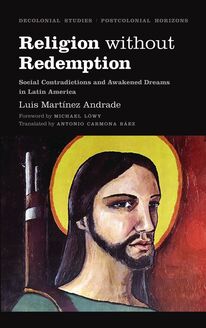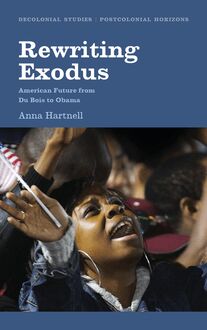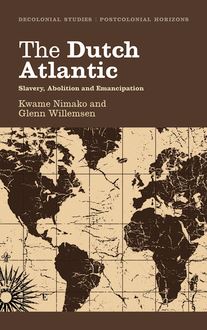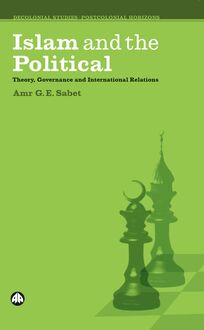-
 Univers
Univers
-
 Ebooks
Ebooks
-
 Livres audio
Livres audio
-
 Presse
Presse
-
 Podcasts
Podcasts
-
 BD
BD
-
 Documents
Documents
-
- Cours
- Révisions
- Ressources pédagogiques
- Sciences de l’éducation
- Manuels scolaires
- Langues
- Travaux de classe
- Annales de BEP
- Etudes supérieures
- Maternelle et primaire
- Fiches de lecture
- Orientation scolaire
- Méthodologie
- Corrigés de devoir
- Annales d’examens et concours
- Annales du bac
- Annales du brevet
- Rapports de stage
La lecture à portée de main
Découvre YouScribe en t'inscrivant gratuitement
Je m'inscrisDécouvre YouScribe en t'inscrivant gratuitement
Je m'inscrisEn savoir plus
En savoir plus

Description
Sabet argues that rather than leading to a 'Clash of Civlizations' or the assimilation of Islam into the Western system, a positive process of interactive self-reflection between Islam and liberal democracy is the best way forward.
Beginning this process, Sabet highlights key concepts of Islamic political thought and brings them into dialogue with Western modernity. The resulting synthesis is essential reading for advanced undergraduate and graduate students of Islamic and Middle Eastern politics, political theory, comparative politics and international relations.
Acknowledgements
Introduction
1. Religion, Politics and Social Change: A Theoretical Framework
2. Islam and the Appropriation of Modernity
3. Welayat al-Faqih: an Islamic Theory of Elite Hegemony or, Assabiyyat Al-khawass
4. The Islamic Paradigm of Nations: Toward a Neo-Classical Approach
5. Islam, Iran and Western Discourse: Behind the Democratic Veil 6. Liberalism and the Contestation of Islamic Sovereignty
7. Human Rights: A Double Discourse of Power
8. Interview
Bibliography
Index
Sujets
Informations
| Publié par | Pluto Press |
| Date de parution | 20 mai 2008 |
| Nombre de lectures | 0 |
| EAN13 | 9781849643818 |
| Langue | English |
| Poids de l'ouvrage | 1 Mo |
Informations légales : prix de location à la page 0,0000€. Cette information est donnée uniquement à titre indicatif conformément à la législation en vigueur.
Extrait
Islam and the Political
SSabet 00 pre iabet 00 pre i 220/3/08 14:25:210/3/08 14:25:21DECOLONIAL STUDIES, POSTCOLONIAL HORIZONS
General editors:
Barnor Hesse (Northwestern University) and S. Sayyid (University of Leeds)
Since the end of the Cold War, unresolved conjunctures and crises of race,
ethnicity, religion, diversity, diaspora, globalization, the West and the
nonWest, have radically projected the meaning of the political and the cultural
beyond the traditional verities of Left and Right. Throughout this period,
Western developments in “international relations” have become increasingly
defi ned as corollaries to national “race-relations” across both the European
Union and the United States, where the reformation of Western imperial
discourses and practices has been given particular impetus by the “war against
terror.” At the same time hegemonic Western continuities of racial profi ling
and colonial innovations have attested to the incomplete and interrupted
institutions of the postcolonial era. Today we are witnessing renewed critiques
of these postcolonial horizons at the threshold of attempts to inaugurate the
political and cultural forms that decolonization now needs to take within and
between the West and the “non-West.” This book series explores and discusses
radical ideas that open up and advance understandings of these politically
multicultural issues and theoretically interdisciplinary questions.
SSabet 00 pre iiabet 00 pre ii 220/3/08 14:25:210/3/08 14:25:21Islam and the Political
Theory, Governance and
International Relations
AMR G. E. SABET
Pluto P Press
LONDON ANN ARBOR, MI
SSabet 00 pre iiiabet 00 pre iii 220/3/08 14:25:210/3/08 14:25:21First published 2008 by Pluto Press
345 Archway Road, London N6 5AA
and 839 Greene Street, Ann Arbor, MI 48106
www.plutobooks.com
Copyright © Amr G. E. Sabet 2008
The right of Amr G. E. Sabet to be identifi ed as the author of this work has been
asserted by him in accordance with the Copyright, Designs and Patents Act 1988.
British Library Cataloguing in Publication Data
A catalogue record for this book is available from the British Library
ISBN 978 0 7453 2720 4 hardback978 0 7453 2719 8 paperback
Library of Congress Cataloging in Publication Data applied for
This book is printed on paper suitable for recycling and made from fully managed
and sustained forest sources. Logging, pulping and manufacturing processes are
expected to conform to the environmental regulations of the country of origin.
10 9 8 7 6 5 4 3 2 1
Designed and produced for Pluto Press by
Chase Publishing Services Ltd, Fortescue, Sidmouth, EX10 9QG, England
Typeset from disk by Stanford DTP Services, Northampton, England
Printed and bound in the European Union by
CPI Antony Rowe, Chippenham and Eastbourne
SSabet 00 pre ivabet 00 pre iv 20/3/08 14:25:2120/3/08 14:25:21Contents
Acknowledgements vi
Introduction 1
1 Religion, Politics, and Social Change: A Theoretical
Framework 28
2 Islam and the Appropriation of Modernity 62
3 Wilayat al-Faqih: An Islamic Theory of Elite Hegemony or,
Assabiyyat al-Khawass 97
4 The Islamic Paradigm of Nations: Toward a Neoclassical
Approach 125
5 Islam, Iran, and Western Discourse: Behind the
Democratic Veil 152
6 Liberalism and the Contestation of Islamic Sovereignty 176
7 Human Rights: A Double Discourse of Power 202
Interview 247
Notes 265
Bibliography 284
Index 301
SSabet 00 pre vabet 00 pre v 220/3/08 14:25:210/3/08 14:25:21Acknowledgements
This book is mostly a compilation of versions of articles which have
been published earlier in English. Exceptions are the Introduction, the
fi nal chapter—which has been translated and published in Turkish
but has not appeared in English—and the interview.
Chapter 1 was published in Religion, State and Society, vol. 24 (2/3)
(September 1996). Chapter 2 in Orient, vol. 38/1 (March 1997).
Chapter 3 was also published in Orient, vol. 35/4 (December 1994).
Chapter 4 was published twice in different academic journals, Peace
and Confl ict Studies, vol. 8/2 (November 2001) and Religion, State and
Society, vol. 31/2 (June 2003). Chapter 5 was published with minor
modifi cation to the title in Amsterdam Middle East Papers (AMEP),
Amsterdam: Research Center for International Political Economy and
Foreign Policy Analysis, no. 1 (July 1995). Chapter 6 was published
in The Emirates Occasional Papers as a monograph (Emirates Center
for Strategic Studies and Research [ECSSR], vol. 52, 2003). Finally,
Chapter 7 on “Human Rights” was published in Turkish, in Human
Rights Review, Turkey 4/7 2007). I wish to thank all the editors of the
above journals for granting permission to republish these articles.
In addition, I owe a debt of gratitude to friends and colleagues
who have helped so much in making this work a reality, in particular
to the Decolonial Studies series general editors Barnor Hesse and S.
Sayyid. Special thanks to S. Sayyid (University of Leeds, UK), who
suggested the idea for the book, made valuable comments, and to
whom I am much indebted for all his help and encouragement in
bringing this project to fruition. The same of course goes for Barnor
Hesse (Northwestern University, USA).
I would also like to extend my thanks to David Castle, Commissioning
Editor at Pluto Press, for supporting this perhaps challenging project,
and for his willingness to accommodate “alternative perspectives.”
The interview that closes the book would not have been possible
without the sincere and tireless efforts of—in alphabetical order—
Cemalettin Hashimi, Shehla Khan, and Nuh Yilmaz to whom I
express my deep appreciation for their collaboration and help in
conducting the interview.
The anonymous reviewers who supported the publication of
this work deserve a good part of my gratitude, particularly for their
positive and helpful comments which I have attempted to address
vi
SSabet 00 pre viabet 00 pre vi 220/3/08 14:25:210/3/08 14:25:21Acknowledgements vii
wherever possible in the book. Any shortcomings, however, remain
the sole responsibility of the author.
Last but not least, I wish to convey my indebtedness to the
Department of Public Administration, Vaasa University, Finland,
and to all my friends and colleagues there, who have made my visit
most enjoyable and productive. My stay at the Department during
the 2006–2007 academic year was instrumental in accomplishing
the writing of the book.
SSabet 00 pre viiabet 00 pre vii 220/3/08 14:25:210/3/08 14:25:21Introduction
ISLAMIC POLITICS OR POLITICS OF ISLAM: SOME CONCEPTUAL ISSUES
Tenuous differences between terms such as Islamic politics and politics
of Islam frequently lead to conceptual confusion. Discerning the
relationship between both, therefore, is a matter of complexity and
subtlety as well as of risk and intrigue. It is complex and subtle because
in many cases the two are organically linked and intertwined. Islamic
politics by necessity if not by defi nition incorporates politics of Islam.
Risk and intrigue, however, emanate from the fact that the opposite
does not necessarily hold true. Politics of Islam do not inevitably
refl ect Islamic politics. Mixing up both is a major source of confusion,
uncertainty, and disorientation. In many ways, the problem is similar
to mystifi cation of ontology and epistemology on the methodological
level, strategy and tactics in political and military decision-making,
constant values and changing circumstances or conditions on the
level of parameters and variables, and consistency and discrepancy at
the operational level. While all may be organically linked, inherent in
their relationships are potential contradictions. When epistemology
for instance always falls back on its ontology dialectically or otherwise,
this is a case for a consistent self-referential method of thinking. In
the different case where epistemology refers to an alien ontology,
such as, for example, when Islamic values are justifi ed in terms of an
external knowledge system, the outcome is very different and likely to
be other-referential. The same holds true when we talk about strategy
and tactics. The best of strategies could be supported or undermined
by consistent or discrepant tactics, respectively. By the same line of
reasoning, politics of Islam may consolidate Islamic politics, or in
some cases may go so far so as to undermine it. Involved of course
are issues of methodological performance, but also of credibility in
the light of which micro politics, i.e. the details, the trees, are tested
against the macro politics, i.e. the broad picture, the forest. Clarifying
differences between Islamic politics and politics of Islam, therefore,
is not simply a matter of definitions or of posing comparative
distinctions, but also involves a process of conceptual construction.
This requires creative and mutually buttressing theoretical
conceptualization and understanding competencies and capabilities, linking
the abstract and the concrete.
1
SSabet 01 intro 1abet 01 intro 1 220/3/08 16:07:030/3/08 16:07:032 Islam and the Political
Theories, as Kenneth Waltz has observed, are made “creatively”
(Waltz 1979:9). “The paradox of creativity,” however, “is that it
requires both great familiarity with a subject matter, and the ability
to approach it from a fresh angle” (Kleindorfer et al. 1993:55). By
the same token, it must follow a “due process of inquiry” which
relates the logic, procedures, and choice of appropriate approaches,
to the relevant subject matter (Landau 1972:219–21; quoted by Waltz
1979:13). The process of creativity is thus strongly correlated with the
problematization of issues and the search for alternatives; in Islamic
parlance, to ijtihad. Limitations caused by self-imposed constraints,
connected to feelings of “self-discouragement” that a particular
course of theoretical creativity or action policy is not p
-
 Univers
Univers
-
 Ebooks
Ebooks
-
 Livres audio
Livres audio
-
 Presse
Presse
-
 Podcasts
Podcasts
-
 BD
BD
-
 Documents
Documents
-
Jeunesse
-
Littérature
-
Ressources professionnelles
-
Santé et bien-être
-
Savoirs
-
Education
-
Loisirs et hobbies
-
Art, musique et cinéma
-
Actualité et débat de société
-
Jeunesse
-
Littérature
-
Ressources professionnelles
-
Santé et bien-être
-
Savoirs
-
Education
-
Loisirs et hobbies
-
Art, musique et cinéma
-
Actualité et débat de société
-
Actualités
-
Lifestyle
-
Presse jeunesse
-
Presse professionnelle
-
Pratique
-
Presse sportive
-
Presse internationale
-
Culture & Médias
-
Action et Aventures
-
Science-fiction et Fantasy
-
Société
-
Jeunesse
-
Littérature
-
Ressources professionnelles
-
Santé et bien-être
-
Savoirs
-
Education
-
Loisirs et hobbies
-
Art, musique et cinéma
-
Actualité et débat de société
- Cours
- Révisions
- Ressources pédagogiques
- Sciences de l’éducation
- Manuels scolaires
- Langues
- Travaux de classe
- Annales de BEP
- Etudes supérieures
- Maternelle et primaire
- Fiches de lecture
- Orientation scolaire
- Méthodologie
- Corrigés de devoir
- Annales d’examens et concours
- Annales du bac
- Annales du brevet
- Rapports de stage













